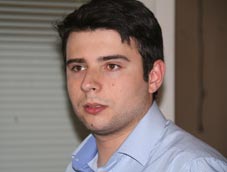The war in Tskhinvali as I saw it
By Temuri Kiguradze (continued from yesterday's Messenger)
Friday, June 18

A few hours later I managed to persuade the doctor to let me make a call from his cellphone. The phone, like the majority of South Ossetian cellphones, was connected to the Georgian network. I called my family and said that I’m alive, then managed to communicate with friends of my American Editor.
Just as the nurse had told us, as soon as the shooting calmed down the hospital began to fill up with journalists. We gave many interviews and asked for help. Colleagues sympathised with us but could not get us any help. One Ukrainian reporter said that he was waiting for the moment he could get out of South Ossetia himself. “You know how they treat Ukrainians now” he told me. A reporter for Russian Newsweek magazine, Orkhan Jemal, came along. He told us that Sasha and Giga worked for this publication and promised to get in touch with journalists in Tbilisi and Moscow and let them know our status.
After some time doctors told us that they planned to evacuate the wounded to the Russian town of Vladikavkaz, about three hours by car from Tskhinvali. However, for now, they were waiting for the military actions to cease.
Closer to the second half of that day Irina Gagloeva, head of separatists’ press committee, visited us. I knew her from back in Tbilisi, when I had to write articles about South Ossetia. She and her committee were one of the few sources we could get in Tskhinvali. Gagloeva loudly and proudly informed us that we had arrived in South Ossetia following the troops, riding an armed infantry vehicle. She also added that our goal was to film the “victory of Georgian soldiers” and the “mass killings of the innocent population”. Gagloeva finished her speech by stating that Georgians are a “genetically ugly” nation and that our troops had managed to conduct the “genocide of the Ossetian Nation” in two days.
This noise attracted the passing rebels who had suddenly found out where we come from. One guy, pointing his Kalashnikov at me, asked "why the f..ck are you being treated here?” and invited me to go out. The arriving doctors were able to calm Gagloeva and the soldiers, but the rumour about the Georgian and the American was spread throughout the hospital.
During the bandaging of my wound the doctor advised me not to get up from the bed for my own safety. At the same time I was approached by a female doctor who leaned into my ear and whispered. I shuddered - she whispered in the Georgian language
– Don’t be afraid. I'm Georgian, I was born and grew up here, just be careful. We - the doctors, will not let them hurt you.
In the evening I again tried to ask to call from Kostya’s mobile. He agreed and took me to what was left of the doctors’ lounge on the second floor. Closing the door I heard a strong Georgian swearing in front of him. “Can’t you see what happens? Who the hell needs that? Do you know how many mixed families live here?” muttered the tall, bald man in a white coat, mixing Russian with awful swearing in my native tongue.
Kostya said that there was no progress with us, he hadn’t managed to contact either the OSCE mission or the peacekeepers. “Your only chance is to get out with the other wounded to Vladikavkaz. But I’m not even sure if we can do this…”
After that he confessed – “You should understand, you are Georgian, nobody really gives a damn about you, but if the American kicks the bucket here that will be real trouble. Now he has only a few days left – soon it will be too late for surgery.”
This is an extract from a story, the rest of which will appear in the next issues of The Messenger.
